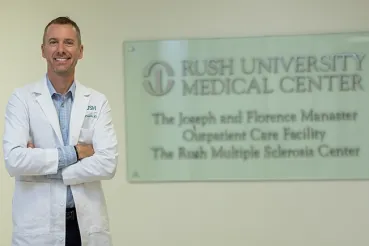Christopher G. Goetz, MD, has dedicated his entire career to improving the lives of people with movement disorders. Since graduating from Rush Medical College in 1975, he has cared for thousands of patients, mentored and inspired countless physicians, authored hundreds of publications to advance neurological science, and served in numerous leadership roles for national and international movement disorders organizations.
After residencies at Rush and Michael Reese Medical Center, Dr. Goetz joined Rush full time. He led the Rush Parkinson’s Disease and Movement Disorders Program for 30 years, recognizing the value of gathering specialists in one suite to collaborate and garnering international acclaim in the process.
After 50 highly productive years in medicine, he will enjoy a well-deserved retirement at the end of June 2025. Deborah A. Hall, MD, PhD, the Parkinson’s Foundation Chair of Neurological Sciences, will carry on the program’s legacy. Philanthropic funding from the Dr. Goetz Endowed Research and Education Fund will support Dr. Hall and her team to that end.
Contributing major developments to the field
Throughout his career, Dr. Goetz witnessed and contributed to groundbreaking treatments and developments in our understanding of movement disorders.
He observed some of the first clinical applications of the drug levodopa in the early 1970s and the dramatic success of deep brain stimulation for tremor treatment in more recent years. Each markedly helped patients who experienced debilitating symptoms before the treatments. He also contributed to the field’s groundbreaking discovery that aggregations of the protein alpha synuclein cut off oxygen supply to dopamine cells, leading to the development of Parkinson’s disease and other movement disorders.
When a dopamine cell bursts, fragments of the synuclein clump act like a virus or bacteria and may penetrate other cells, creating a propagating illness.
“We don’t know exactly how this process starts yet, but we’ll crack that,” Dr. Goetz said. “We need to figure out what is causing the first aggregation of alpha synuclein. To be able to treat and stop the disease from getting any worse would be heroic. We’re starting to do that with antibody research programs.
“To me, seeing all three of these advances in one career and to have participated in all of them is pretty thrilling.”
Among his most prominent contributions to the field, Dr. Goetz led the development of the Movement Disorder Society-Unified Parkinson’s Disease Rating Scale, a standardized tool for physicians worldwide to evaluate and measure changes in patients’ motor and nonmotor symptoms. This scale is now the gold standard in the field.
Training the next generation
While Dr. Goetz’s research and academic work have crossed international lines, so, too, has his mentorship, especially through the Rush Movement Disorders Fellowship and the International Parkinson and Movement Disorder Society’s Training Scholars Leadership Program.
Gian Pal, MD, associate professor in the Division of Movement Disorders at Rutgers Robert Wood Johnson Medical School, credits Dr. Goetz with advancing his success as a clinician-scientist. While most early-career faculty positions require frequent clinical time, Dr. Goetz advocated for the creation of a unique position that protected 40% of Dr. Pal’s time for research, helping him advance his work to secure grant funding from the National Institutes of Health.
“This springboarded my career,” Dr. Pal said. “I’ve always modeled myself after him. Even the most devastating diagnosis he could deliver with such care. He didn’t sugarcoat but struck a balance between being compassionate and realistic.
“To this day, when I’m delivering those kinds of diagnoses to patients, I channel his voice. He’s a dynamic force. There are few people like him, with his work ethic and desire to help teach and advance science.”
Perennially providing top-tier patient care
Throughout his career, Dr. Goetz oversaw scientific advancement consistently rooted in the needs of his patients.
“He puts my interests first and advocates for me, and I appreciate that,” said Tom Meagher Jr. “I’ve gone to him with many questions over the past few years, and he’s always been insightful with his responses. He stands by his convictions, has high standards and is highly ethical.”
Dr. Goetz always found joy in the science of medicine and laboratory work, but the gratitude he received from patients was unparalleled.
“I think of this whole family of people who all have basically the same disease, but each is facing challenges with his or her own courage and integrity,” Dr. Goetz said. “There is no real ‘the Parkinson’s.’ It’s ‘my Parkinson’s’ with each personal version being a valid and treatable challenge that the doctor and patient face together.
“When a patient and family say thank you, it is a cherished gift. The thanks you receive for one’s fidelity over many years — that’s a very special kind of message to a doctor.”
Where is the field heading?
In the immediate future, the challenge Dr. Hall, the Rush team and their colleagues worldwide face is to keep advancing science toward a preventive treatment or even a cure for Parkinson’s disease — work that will take both money and time. And, at a larger scale, deeper questions about the brain and its evolution remain.
“By evolutionary standards, our cortex has evolved enormously, but the brain stem has not,” Dr. Goetz said. “Even if we crack the synuclein issue, we still have an evolutionarily compromised brain stem, and we’re not going to get around that. Cultural evolution is much more rapid than cellular or molecular evolution, and so society is moving forward, demanding new things, new technology, new skills — using your thumb for your iPhone and doing things that, even 10 years ago, people didn’t have to do.
“We’re dealing with a problem that is really part and parcel of the human state, and we’re not going to get around it. We’re still going to have brain stem disease. Will it look like Parkinson’s? I don’t know, but I think that it will.”
And, for that reason, movement disorders specialists will always be needed. Building upon Dr. Goetz’s instrumental contributions to the field, Rush remains committed to training future clinicians, advancing research and — above all — providing the highest-quality patient care.
“I’m proud of what I’ve accomplished, and I’m proud to pass the baton,” Dr. Goetz said. “I think our group is strong, but it needs to carry on with a new leader. Deborah is the right person to do that.”




